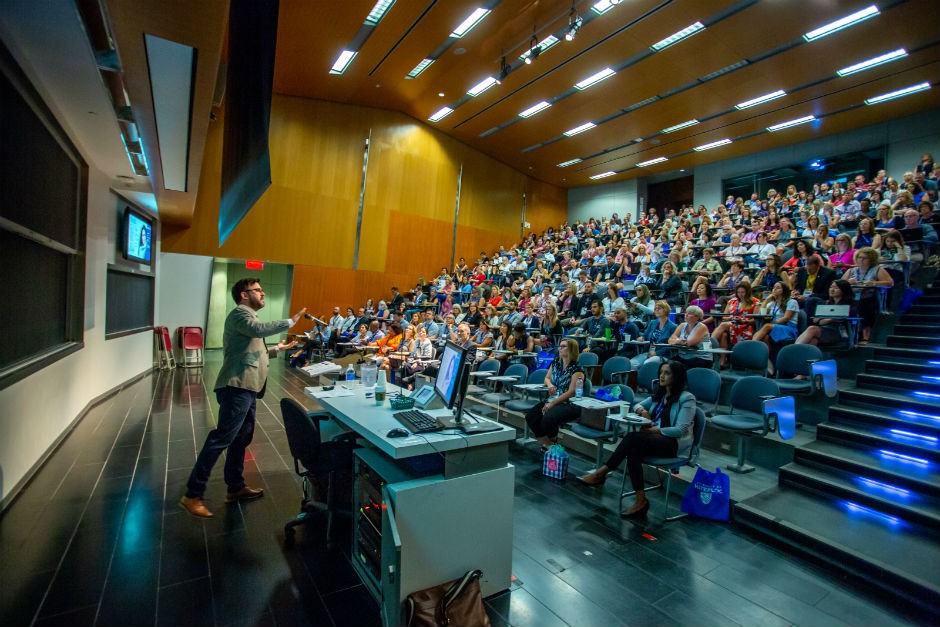Lea Kabiljo is a doctoral candidate in the Art Education program at Concordia, having obtained her Bachelor and Master's degrees from the same department. Prior to returning to Concordia to pursue her PhD she worked as a high school teacher and was the executive director of LOVE: Leave Out Violence, a leading non-profit organization in violence prevention for youth.
Blog post
An expert beginner

A couple of days ago I dreamed that I was in class, teaching. In my dream, I was trying to talk to a group of students while they completely ignored me. I talked louder. They laughed at me. I yelled. They walked away. Startled, I woke up. Within a second I was relieved — it was only a dream.
As I relaxed, ready to fall back asleep, another realization got my heart beating fast. If I am starting to have those dreams, summer is almost over. The new school year is around the corner and it’s time to get ready.
At the majority of universities, departments offer teaching assignments to their graduate students. These assignments are a great opportunity to gain valuable experience teaching at the university level. However, teaching an undergraduate course can also be quite stressful. Being passionate and knowledgeable about a topic is one thing, but being able to transmit that passion in an accurate and meaningful way is a whole different game.
I have been a teacher for most of my adult life. I have taught in diverse settings and across various academic levels. My experiences as a teacher were all different, one from another. Some were thrilling while others were more challenging. Through them all though, I learned it doesn’t matter that much what you teach, where, or to whom. What matters the most is how you teach.
Here are a few things I have learned about teaching that might be useful for those getting ready to teach this semester.
Accept that you’re an expert-beginner. As a teacher, you are considered to be an expert in your discipline. However, every time you teach to a new group of students, no matter how many years of experience you have, you are always a beginner. Recognize that and be patient — establishing yourself with a new group takes time.
Set realistic expectations. This applies for you and your students. You will not be able to teach everything, and that is okay. What is important is not just how much they learn, but what your students remember.
Don’t let your ego get in the way. When a student is unmotivated, disrupting the class or being rude, respond appropriately. Do not make it personal — their behaviour is not an attack on you.
Be a good listener. This is one of the most important traits of a successful teacher. Listen, not only to the student’s words, but also to their silences, changes in tone, emotions and body language. You’ll be surprised how much you’ll learn about your students by listening.
Adjust accordingly. Recognize what is working and what is not working, and make changes when necessary. Plan your lessons thoroughly so you will have the flexibility to be able to make real-time adjustments in your class. As a teacher you are interacting with other people, therefore you cannot predict or control everything.
Admit when you’re wrong. Everyone makes mistakes. What you do about it afterwards is what makes a difference. An appropriate apology from a teacher can be more meaningful to students than any other lesson you will teach them.
Ask for help. Teaching, especially in the beginning, can be stressful and overwhelming. Don’t be afraid to reach out to your colleagues or the administration. Asking for advice is not a sign of weakness. It shows that you are willing to learn and that you recognize the experience of others. Your colleagues will be flattered.
Be yourself. If you are comfortable and at ease your students will feel the same way. Find the style of teaching that works for you. Enjoy yourself, don’t be afraid of being silly and let your passion for what you teach show.
I wish you all a fun and successful teaching semester!
If you’re a Concordia graduate student who is interested in teaching, make sure to check out a variety of workshops offered by GradProSkills.
About the author


